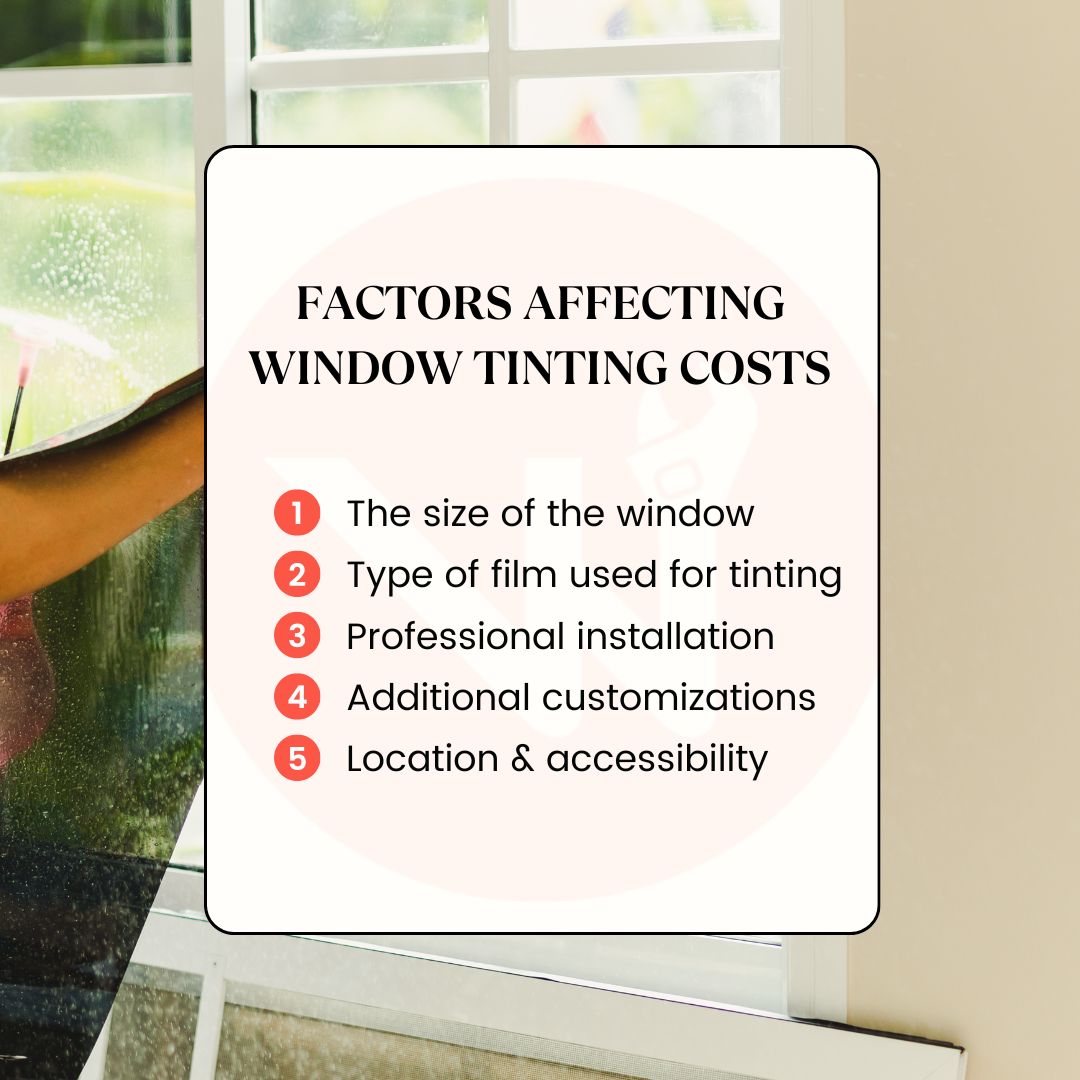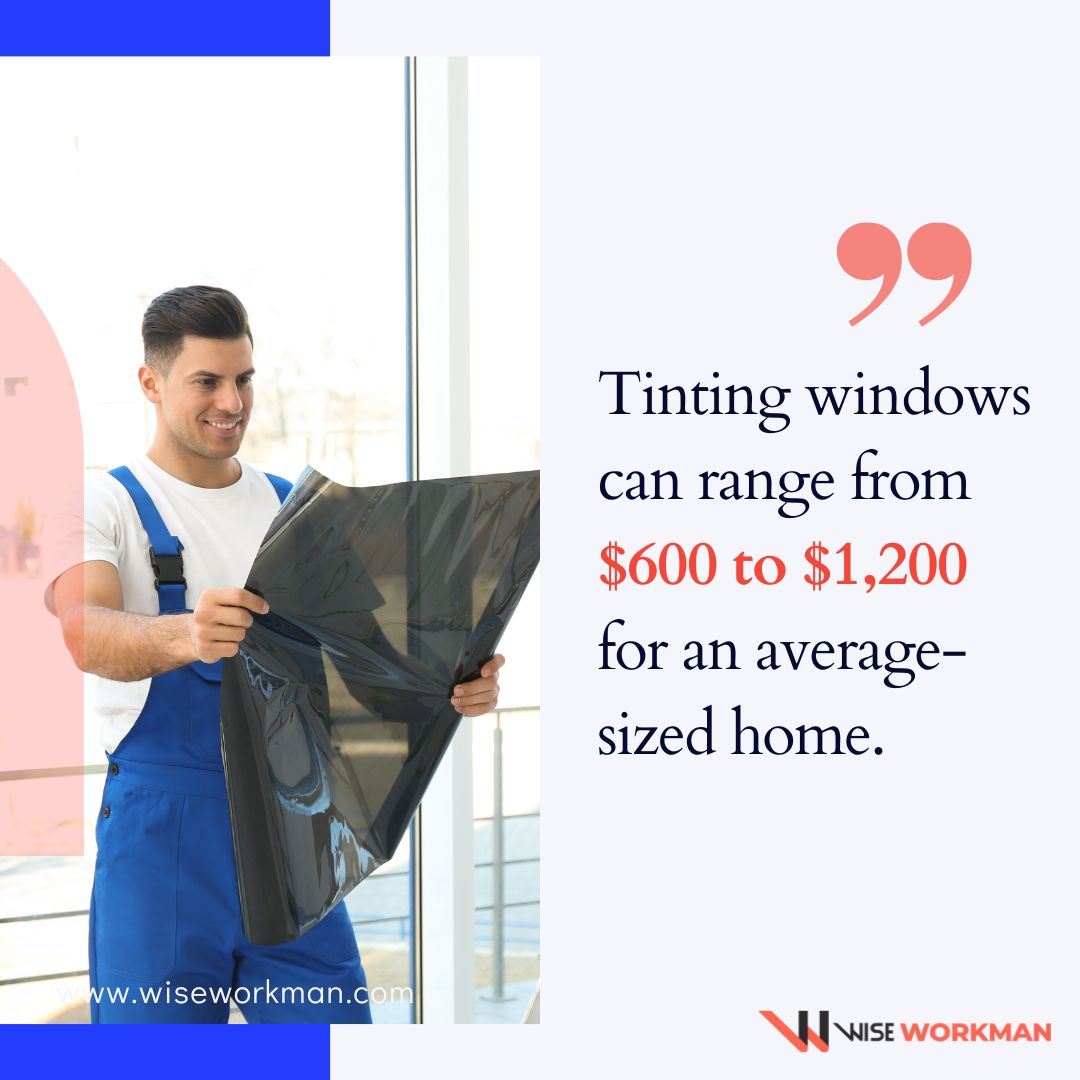Are you wondering about the cost of window tinting for your home? In this guide, we'll explore "How Much Does It Cost to Tint Windows" in simple terms. Window tinting involves adding a special layer that brings numerous benefits.
Tinted windows keep your home cooler, provide privacy, and shield your furniture from harsh sunlight. They also add a touch of style!
Beyond aesthetics, they're like a superhero for your home, saving energy and adding an extra layer of security. The cost varies based on factors like window size, type of tint, and whether you opt for DIY or professional installation.
Remember, it's not just about the price tag but also the many advantages that come with it. Tinted windows are what your home needs for a cooler, more private space.
When it comes to window tint cost, several key factors play a significant role.
Understanding these cost-influencing factors is essential for anyone considering this enhancement for their home or vehicle. Let's explore the variables that impact the price of tinted windows.

The size of the windows being tinted is a primary determinant of the overall cost. Larger windows require more tinting material and time for installation, leading to higher expenses.
Understanding how much to tint windows largely depends on the dimensions of the glass surfaces involved.
The type of tint film selected also affects the overall cost. Different films offer varying levels of UV protection, heat reduction, and privacy.
High-quality films often come at a premium, while standard options may be more budget-friendly. Consider your priorities when estimating how much do tints cost.
Opting for professional installation can impact the window tint cost. While DIY kits are available, hiring a skilled installer ensures precise application and long-lasting results.
Professional expertise may come with an additional cost, but it often leads to a superior and more durable outcome.
Specific window tinting options come with extra features or customizable elements that can affect the overall cost. For instance, specialized films with advanced UV-blocking properties or decorative patterns may have a higher price point.
The location and accessibility of the windows to be tinted can impact the cost. Windows that are difficult to reach or in tight spaces may require additional time and effort for installation.
Additionally, factors like the climate of your region can influence the type of tinting material recommended, which may affect the overall expense.
Considering these window tinting variables—window size, tint film types, and the choice of professional installation—will give you a clearer picture of how much to tint windows and what influences the cost of tinting car windows.
Remember, investing in quality and expertise can provide long-term benefits in terms of aesthetics, energy efficiency, and UV protection.
Understanding the cost of window tinting is crucial for anyone considering this enhancement.
Here are the average cost ranges for different types of window tinting projects, ranging from residential to automotive.

For homes, window tinting costs can vary based on factors like the type of film, window size, and professional installation. On average, you can invest between $5 to $8 per square foot.
This means tinting windows can range from $600 to $1,200 for an average-sized home.
The cost to tint car windows is influenced by factors such as the type of vehicle, the quality of the tint film, and any additional features.
On average, automotive window tinting can range from $100 to $400 per vehicle. This range caters to varying needs and preferences, offering options for different budgets.
Remember, these are estimated window tinting expenses, and actual costs may vary based on specific requirements.
Whether you're considering residential or automotive tinting, understanding how much to tint windows is a crucial step toward making an informed decision.
Keep in mind that investing in professional installation and quality materials can lead to long-lasting benefits in terms of aesthetics, UV protection, and energy efficiency.

When it comes to window tinting, there are two main avenues to consider: the do-it-yourself (DIY) route or enlisting the services of a professional installer.
Both avenues present their own advantages and drawbacks, with cost being a significant factor to take into account.
Let's dive into a comprehensive comparison of DIY versus professional tinting costs, factoring in elements like the average window tint cost , to begin with, to empower you to make a well-informed decision.
| Aspect | DIY Tinting | Professional Installation |
| Cost Range | $20 - $50 | $5 - $8 per sq. ft. |
| Materials Included | Tint film, application tools, instructions | High-quality materials, expert application |
| Expertise Required | Limited | Skilled professional recommended |
| Result Quality | Potential for uneven tint, air bubbles | Professional-grade finish, polished outcome |
| Long-Term Durability | It may require reapplication over time | Durable, long-lasting results |
| Customization Options | Limited | Wide range of tint films for various preferences |
| Time Investment | DIY process, variable completion time | Efficient, timely installation |
| Additional Costs | Potential for redoing if results are unsatisfactory | No additional costs for reapplication |
| Warranty | Generally not included | Often includes a warranty for the work |
| Overall Consideration | Budget-Friendly, but potential for suboptimal results | Assurance of high-quality, long-lasting outcome |
In summary, while DIY kits may seem budget-friendly, the potential for suboptimal results could lead to additional expenses in the long run. Professional installation offers a higher upfront cost, but it provides the assurance of a high-quality, long-lasting outcome.
When evaluating how much tints cost, consider the value of a professional touch for a result that truly enhances your space.
When evaluating the total expenses associated with window tinting, it's crucial to consider a few additional factors beyond the basic installation costs. These elements can significantly impact the overall investment and should not be overlooked:
Opting for a tinting service that includes a warranty can offer peace of mind. This warranty may cover issues like bubbling, discoloration, or peeling, ensuring that any unforeseen problems are addressed without incurring additional costs.
The current condition of your windows can influence the cost of tinting. Older windows or those in need of repairs may require additional attention or preparation, potentially affecting the overall expenses.
Window tinting costs can vary based on your location. Factors such as local labor rates, market demand, and supply availability can all play a role in determining the final price.
It's advisable to obtain quotes from multiple sources to understand the pricing landscape in your specific area.
The quality of the tint film itself can impact the overall cost. High-grade films with advanced features, such as enhanced UV protection or specialized coatings, may come at a premium compared to standard options.
Considering these additional aspects alongside the fundamental installation costs provides a more comprehensive understanding of how much does it cost to tint windows.
Remember, investing in quality materials, addressing any window condition issues, and factoring in local pricing variations can lead to a more satisfactory and long-lasting result.
Keep these considerations in mind to make an informed decision regarding tinted windows' cost for your specific needs and location.
Understanding the expenses tied to window tinting is a key step in making informed decisions for your home or vehicle. The question on everyone's mind is often, 'how much does it cost to tint windows?'
The answer depends on various factors, including window size, type of tint film, and the choice between DIY or professional installation.
While DIY kits may offer a budget-friendly option, professional installation ensures a high-quality, long-lasting result. It's important to weigh the initial investment against the potential benefits in terms of UV protection, energy efficiency, and enhanced aesthetics.
Additionally, considering warranties, window conditions, and local pricing variations provides a comprehensive view of the overall investment.
By factoring in these elements, you can make a smart decision that aligns with your specific needs and budget.
Ready to explore window tinting options? Contact a professional installer near you for personalized advice and quotes today!